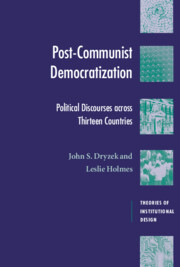Book contents
13 - Bulgaria
Published online by Cambridge University Press: 22 September 2009
Summary
To the careful observer, of whom there have been too few, Bulgaria presents a democratization paradox. Cursory assessments by those who appear not to have studied the country in depth have often tended to be negative, consigning Bulgaria to the long-term laggard category. Such assessments are influenced by the image of the Balkans as backward. Some writers with deeper knowledge of Central and Eastern Europe have reached the same conclusion. For example, Gati (1996, esp. pp. 169–71 and 193) expected Bulgaria to become ever more clearly a “semiauthoritarian regime.” Vachudová and Snyder (1997) argue that the dominance of “nationalist former communists” in Bulgaria (as well as in Slovakia and Romania) between 1989 and 1996 signaled that the Bulgarian transition was different in kind from those in CEE, installing a regime that allowed ethnic politics to prosper. Even Hellén, Berglund and Aarebrot (1998), while generally more sensitive to the dangers of stereotyping and more upbeat about the prospects for democracy in most of CEE, argue that Romania and Bulgaria are mere transition democracies, in contrast to the clearly consolidating democracies of Poland, Czechia, and the three Baltic states. They attribute a North–South divide to “the resilience of authoritarian features in the Balkans,” which in turn is strongly related to “the clientelistic heritage in that particular region” (Hellén, Berglund and Aarebrot, 1998, pp. 365–6). Such depictions of backwardness are reinforced by the tendency of writers in CEE to use the concept of the Balkans as a constituting other (see Todorova, 1997).
- Type
- Chapter
- Information
- Post-Communist DemocratizationPolitical Discourses Across Thirteen Countries, pp. 206 - 222Publisher: Cambridge University PressPrint publication year: 2002
- 1
- Cited by



